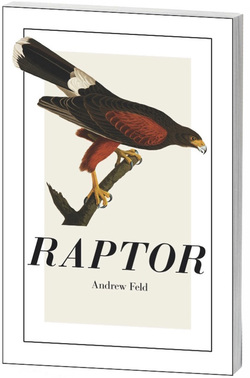|
At the center of Andrew Feld's fiercely pessimistic second collection of poems, Raptor, are the great birds that give the book its name, the falcons, eagles, hawks and owls that hunt and “feed only upon their prey.” With long, knotty sentences that strain against the line, Feld traces the raptor through a wide range of interactions with the human world, from the art of falconry to the endangered species list, from the eagle sigils of empire to Shakespearean metaphor. Feld also draws from his own experience nursing injured birds back to health at the Cascade Raptor Center in Eugene, Oregon. In all of the poems, the raptor is depicted as being fundamentally unknowable despite its longstanding fetishization by governments and celebration by poets (including Feld’s own frank admiration). If the raptor sometimes hunts with humans, it does so only because “hunting with one specific human leads to eating better than hunting alone in the wild.” Yet for all this the raptor is still subject and vulnerable to the human world, encroached upon by our bulldozers and shot down by our rifles.
One of Feld’s projects in the book is to seek ways to bridge the gap between ourselves and the raptor without appropriating or romanticizing it as so many have done in the past. One way to do so is simply to perceive the raptor clearly, and indeed, the act of looking is emphasized in many of the poems through the specific mention of the camera lenses and binoculars, rearview mirrors and wide screen televisions that serve as our intermediaries. The poems themselves are also deeply invested in perception, capturing their birds in elaborate detail, as in these minutely descriptive lines from “Visitant,” which take note of “each strand of the swing feathers’ dark leading / Edge and pale puffy white bars of the underwing coverts.” Yet for all of its acuity, “Visitant,” finally, is a poem about the raptor’s elusiveness and the failure of perception. Despite the speaker’s best efforts and expensive equipment he can’t seem to fix the falcon clearly in his lens or his gaze, “although / To see it sharply is all I would ever ask of this world.” Raptor also draws a parallel between the world of humans and birds of prey in its consideration of cruelty. The foremost human example in the collection is Frederick II of Hohenstaufen, Holy Roman Emperor of the thirteenth century, a man so civilized that he offered to resign his throne to the invading Mongols “if he were allowed to become the khan’s falconer”; a man so depraved that he, “to discover which of two men had better digested his food, the one who had rested after his meal or the other who exercised, had both cut open to see.” Frederick II becomes an emblem of both the best and worst possible human qualities, curiosity and sadism, passion and faithlessness, strangely united in one man. It isn’t the outliers of history who get greatest consideration in the book, however, but the banal cruelty that might express itself any day, in any person. Raptors do violence by instinct; otherwise they would not eat. Might human cruelty also be instinctual, part of our inherent character? One poem that addresses this question is “Little Viral Song,” a dramatic monologue spoken by a collective, “we” the people of the United States (or at least those there who live in safety and comfort). Here is the first stanza, which seems especially germane during this newest Ebola outbreak:
With a barbed irony that dehumanizes both the suffering masses in countries far away and those who watch it like “apocalyptic porn,” the poem suggests that fear is the true infection, sickening us with cruelty and isolation, justifying all behaviors. Yet, with characteristic ambivalence, Feld also acknowledges that there are reasons to be afraid, that cruelty can be a method of self-preservation. The poem’s argument is reinforced by Feld’s inventive formal work; each stanza ingeniously passes its final line to the following stanza in a virus-like replication. Feld is often at his best when his rhetorical momentum meets the resistance of some formal and musical imperative.
This is certainly the case in one of the most powerful poems of the book, “Cascade Raptor Center: Capture,” another account of casual cruelty. The poem tells the story of a boy who has shot a hawk from the sky with his new rifle; his punishment is to travel with his father to the Raptor Center where he must watch the volunteers’ frantic efforts to save the bird’s life. Each stanza of the first section begins with the same line, “He hadn’t meant to hit the bird,” restarting the narrative again and again with a different emphasis each time, each time offering new context or explanation for the boy’s destructive act. As the justifications mount, though, they feel more and more insufficient; the obscurity of the boy’s intentions, even to himself, does not change the outcome. However, the poem also succeeds in making the boy’s plight seem human and universal by showing the way his actions have led to his own oppression and “capture.” What violence is each of us capable of simply through a brief absence of moral attention, through “the boredom that turns into a kind of fever”? And how much do we cause ourselves to suffer through our own cruelty? The second part of the poem winds back the narrative a few hours as the father and son make the long, silent car ride with the injured hawk in a box in the back seat. This section, too, is concerned with cruelty, but here it is the father’s cruelty that gets sharp focus. Though his intentions are good—he hopes to teach his son a lesson—in his coldness and anger, he undermines himself and wounds the one he means to help. The poem suggests that neither father nor son can be redeemed in the aftermath of such violence; only we who witness these events, and who might make different choices because of that witness, can use them for good. Whether we will do so, however, is a question that Raptor leaves very much in doubt. |
Raptor. By Andrew Feld. University of Chicago Press, 2012.
|
CURRENT ISSUE
|
CONTACT
|
DEPARTMENT OF ENGLISH
|



